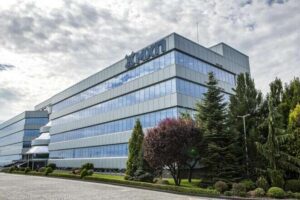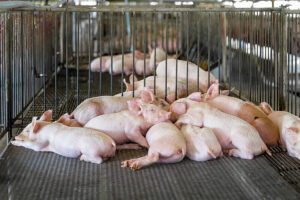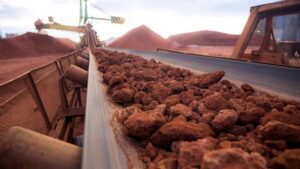
Agroholding MHP in the second quarter of 2022 received $20 million in net profit compared to $232 million in the second quarter of 2021, including excluding exchange rate differences, net profit decreased to $17 million from $201 million.
According to the company’s report on the London Stock Exchange on Wednesday, its revenue amounted to $595 million, an increase of 10% compared to last year.
According to the document, exports accounted for $333 million in revenue, or 56%, while in the second quarter of 2021, $285 million, or 53%.
Operating profit fell 72% to $67 million and adjusted EBITDA (excluding IFRS 16) to $111 million from $277 million in the second quarter last year.
“Despite the fact that MHP continues to face difficult challenges and disruptions in operations, sales and logistics, the company has now been able to restore poultry production at its Ukrainian facilities to almost 100% capacity. In recent months, new, albeit more complex and expensive logistics routes, and export volumes are growing. We expect to complete the grain harvest on almost all of our lands in the second half of the year,” the report says.
According to him, before the end of the year, MHP plans to take advantage of the opportunities of the Cherenomor Grain Initiative for the export of agricultural products.
“The Group incurred significant war-related expenses following the Russian invasion on February 24. For the period ended June 30, 2022, they amounted to nearly $50 million, including donations to support the community, write-offs of stockpiles and biological assets, and other war-related expenses.” , is specified in the document.
At the same time, the company had no material damage to facilities, infrastructure and products in Ukraine, with the exception of the destruction of the leased storage facility (with a loss of about $6 million in production) in March and the suspension of the production of “Ukrainian Bacon” in the Donetsk region, which has now been moved to other locations. in Ukraine.

Member of the European Commission (EC) for Energy Kadri Simson said that on Wednesday, September 14, the EC proposal to address a number of problems that have arisen in the EU energy market will be made public.
“Tomorrow we will submit a proposal that aims to eliminate these problems,” the European Commissioner said on Tuesday, speaking at the plenary session of the European Parliament in Strasbourg.
Among the measures, she, in particular, named a reduction in demand for electricity, limiting the income of energy companies that produce electricity at low costs, contributions from companies that receive excess profits for the production of gas, oil and coal.
Referring to Russian gas imports, Simson noted that a “ceiling” on Russian gas would solve the problem of price speculation. However, more work is needed to assess the risk of a possible negative impact of such a measure on some EU Member States. In addition, the European Commission will continue to analyze how a price cap on all gas imports could function and what the consequences would be.
Geographical structure of total imports of goods and services in 2021 (USD thousand)


The World Bank has already begun work on fundraising and plans to create new trust funds at the request of Ukraine for $17 billion needed for urgent recovery, Roman Kachur, Alternate Executive Director for Ukraine at the World Bank, has said.
“To date, the government has prioritized the $17 billion needed for an urgent recovery, for the most necessary things until the end of 2023. To operate these funds, we are completing the registration of the trust funds,” Kachur said during an online conference of the Center for Economic Strategy on Tuesday .
According to him, the symbolic name of this fund will be MRIya – Multi-donor trust fund for recovery and institution and infrastructure.
Kachur recalled that on September 9, the World Bank and the European Commission presented a report prepared jointly with the UN and the government of Ukraine, according to which direct losses inflicted by Russia from the beginning of the war to June 1 amount to about $100 billion, economic losses – $250 billion, and funds to restore the destroyed until June 1 – about $350 billion.
Of these, the World Bank has set $105 billion as funds needed over the next 18-36 months, but given that “this is an unsustainable amount for either donors or the government,” the government has prioritized $17 billion.
The representative of Ukraine in the World Bank said that trust funds would have to act as a multiplier so that Ukraine could receive two or three dollars from one dollar of funds provided by donors.
“In fact, since Friday, September 9, the fundraising has already begun. We plan to hold a roundtable at the same level during the annual meeting of the IMF and World Bank in October as it was in April – at the level of finance ministers and heads of central banks of our donor partners – and in fact explain the situation and obtain certain commitments to provide funds,” Kachur said.
He said that since the beginning of the war, the World Bank has already transferred $9.4 billion from its own account and from the accounts of trust funds (including U.S. grants, UK guarantees), or 54 cents from every dollar of external support during this period.

The number of pigs of the agricultural holding KSG Agro in August 2022 grew by 20% compared to the beginning of the year, to more than 60,000 heads from 50,000, according to a press release from the agrarian group.
At the same time, in the first half of 2022, the holding increased sales of live pigs by 7%, to 56,700 heads, compared with January-June last year (52,900 heads).
KSG Agro said that the increase in livestock was achieved by improving the quality of the herd due to the purchase of sows and boars, rejuvenating the livestock, as well as improving technologies and production processes.
The vertically integrated holding KSG Agro is engaged in pig breeding, as well as the production, storage, processing and sale of grains and oilseeds. Its land bank is about 21,000 hectares.
The owner and board chairman of KSG Agro is Serhiy Kasianov.

Ukraine in January-August 2022 reduced the import of aluminum ores and concentrate (bauxite) in kind by 72.1% compared to January-August 2021, to 945,207 tonnes.
According to statistics released by the State Customs Service, during this period, bauxite imports in monetary terms dropped by 68.9%, to $48.027 million.
The products were mainly imported from Guinea (59.07% of supplies in monetary terms), Brazil (27.27%) and Ghana (7.5%).
Ukraine in January-August 2022 did not re-export bauxite.
As reported, Ukraine in 2021 reduced the import of aluminum ores and concentrate (bauxite) in kind by 0.1% compared to 2020, to 5.114 million tonnes. Bauxite imports in monetary terms grew by 4.2%, to $236.638 million.
The products were mainly imported from Guinea (59.33% of supplies in monetary terms), Brazil (21.33%) and Ghana (16.8%).
Ukraine in 2021 re-exported bauxite in the amount of 277 tonnes worth $70,000 to Belarus (48.57%), Poland (40%) and the Russian Federation (7.14%).
Bauxites are aluminum ores used as a raw material for the production of alumina, and from it aluminium is made. They are also used as fluxes in ferrous metallurgy.
Bauxites are imported to Ukraine by the Mykolaiv Alumina Refinery, affiliated with RusAl (Russia). Alumina is produced from bauxite.
RusAl also earlier had a stake in the Zaporizhia Aluminum Plant (ZAlK) in Ukraine, which stopped producing primary aluminum and alumina.